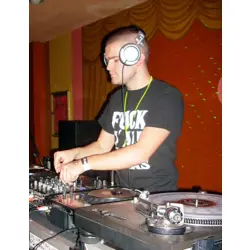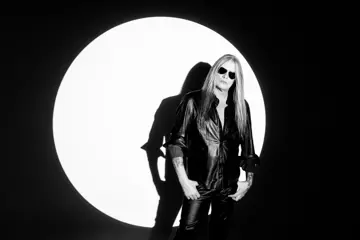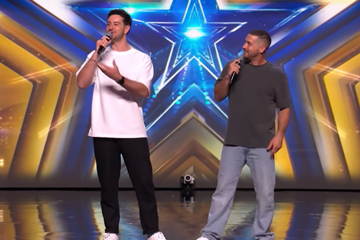 Plastician
PlasticianIn recent years it's been difficult not to go into a club or festival and come out with a whole lot of gooey dubstep all over your shoes. The stuff is everywhere. Its South London underground roots are increasingly difficult to recall, especially as it infests the mainstream and finds even stronger footing on dancefloors and radios around the globe.
One of the early proponents in the Croydon scene was Chris Reed, best known as Plastician, who was instrumental in its early days with his hands on the twin turntables of dubstep and grime. Those were the heady days, early last decade when dubstep wobbled in small club nights and Reed, in his role of both DJ and promoter, gave starts to a lot of the genre's big names. Now that it's a worldwide sound, he says it's encouraging.
“It's exciting and makes me proud to know that I was a part of building the foundations of it with all the Croydon lot – Hatcha, Skream, Artwork, Benga, N Type, Mala, Coki, Loefah etcetera,” he says. “It's almost scary how big it's gotten, but it also can be quite funny as it's so vast now, a lot of the people new to the sound are quite confused as to what is or isn't dubstep.”
Once you start something, and it spreads, it's going to change a lot. You have no control over the way others will interpret the genre and build their own constructions. The original proponents of it have little control over what form the music takes or even what music gets listed under the dubstep moniker. The spread of dubstep was quick, and Reed sees the mutations. “It's changed so much,” he agrees.
Don't miss a beat with our FREE daily newsletter
“You only need to listen to Horsepower Productions – Gorgon Sound – and then spin something from the Magnetic Man album to hear how different it is now. It's been a massive progression and the sound has taken on so many new influences from people coming in from different scenes over the last 10 years.”
It was between the dubstep and grime that Plastician carved out his name, refusing to be defined or limited by just one. After the mutations, those differences have changed. “I think there are more similarities now than when I first started out,” he says. “I used to say that dustup was more sub bass and hip hop-style sampling, and grime was more melodic and midrange-based. But you could say that about current day dubstep, whereas grime has kinda stuck to its guns and sounds similar to how it did in 2002, just a little more polished.”
The worldwide spread, infection and eventual epidemic of dubstep meant the road that lead to festivals and clubs around the world opened up. Reed took to the tour road and became the first grime and dubstep DJ to play on every continent – Antarctica excepted. It wasn't a planned move, but a title Reed is happy to accept. “I think I was lucky in the sense that at the time I was the go-to guy for booking dubstep,” he explains. “I don't really know how that happened. Initially I think it was just because I was easily contactable online, which brought in bookings when we were all doing our own bookings, without an agent.
“Then the production really kicked off for me in '03 and '04 when it was the start of dubstep/grime crossing into electronica markets when I was involved in the first Rephlex Grime compilation. That took me to America, Japan and pretty much all of Europe in the space of about six months. It's since become a bit of a challenge. Most artists have played every continent now but I know nobody has done Antarctica. I'd love to be the first.”
Of those, there's one land that consistently surprises him from behind the decks. “Russia always surprises me,” he says. “There seems to be little or no online interaction from Russian fans, but then when you get out there everyone knows your tracks and wants photos and autographs after the show. It's a nice kind of surprise.”
Somewhere between colonising clubs and raising the dubstep flag at festivals, Reed found time to start his own label. Terrorhythm Recordings is coming up to its tenth anniversary – no small feat, and one that sneaks up at some point when you're busy with the work of putting out releases. “You always hope [that it will last ten years] but the thought never entered my mind,” says Reed. “I've trickled releases out over the years but we're starting to pick up some momentum and new artists right now, so really looking forward to the next ten.”
The tenth anniversary is one of those points that justifies looking back and reflecting, pausing to give yourself some kudos and a pat on the back. And often cake. For Reed, there's been plenty of highlights. Introducing new acts like upcoming Big Ape tour-mate Joker into a larger scene with their early releases is always going to be a point of achievement. Reed agrees. “I think releasing Joker's first 12”, and also Om Unit's first 12” are big accomplishments in their own right. I'm still very proud of my Beg To Differ album as well. Next up we've got a couple of releases lined up from Stinkahbell which I'm really excited about, and also in talks with a couple more new artists as well as re-releasing the early stuff that only ever saw light of day on vinyl until now. This will all happen in 2012 before the year ends.”
There are a more Plastician releases in the pipeline too. “A few in the works,” he reveals. “I'm currently remastering the TERR002 release with some new 2012 remixes from some very big and very diverse artists. That's Cha, Shallow Grave 2002 and The Search, for those who don't know!”
After spending time in the studio and on the road, Reed sees music as one bass-heavy cloth. The three-minute tracks are cut from the same fabric as the three-hour long DJ sets. “Definitely part of the same thing,” Reed confirms. “I play my DJ sets with a track in mind: it has to have a beginning, a middle and an end and should play out like a journey, just like a good track does.”
Pioneer might be an odd word to throw into a genre barely a decade old, but Reed has certainly helped. Through club nights in London he gave starts to some of the bigger names in dubstep. Reed gave Skream some of his early sets, and put Joker's debut release out through Terrorhythm Recordings. Now he's heading to Australia with both of them, friends from way back sailing on a large wobbly fleet of dubstep. “I've only ever been to these parts on my own before and the touring can get quite lonely,” he says. “I know I won't have that problem with these two, and it's always nice to tour with two other artists you've worked with for years. There's no pressure to draw out the bangers and you can really take it deep.”
Deep, dark and wobbly. You can count on that when these three get together in the club.















